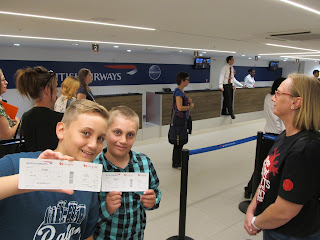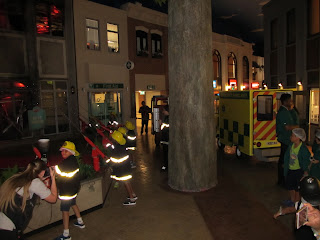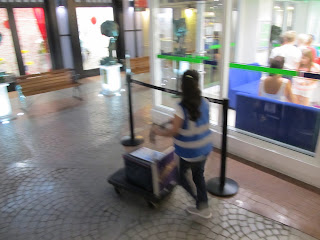Tonight is our last night in the UK. We are heading to Hampton Court Palace for the day tomorrow, prior to returning the hire car and flying out at 10:30pm. This is the final blog of our UK trip.
I'll leave the day's report to the boys ...
Oliver
Hi, Oliver here. Today we went to a detailed city called,- Kidzania!!! It was lots of fun, and us boys enjoyed it very much. This whole city was controlled, and run by kids from ages 4- 14, and was a very friendly environment.
So, you are all probably wondering what it was like,- well it was was an experience not worth missing. When I arrived in this "kid city", I was shocked at how big it was. In fact, it was as big as WestMAC's whole junior school, except, this city had two floors! It was pretty big for a city being run by kids.
Anyway, when I entered the city, the first thing I had to do, was to get a job. Hmmm. I decided I was going to be a pilot of a plane. They actually executed the plan quite well. When I walked in to the plane, the first thing I could see was a big simulator. I sat down in the pilot's chair, I could see a TV screen that was on, so it looked like I was flying a plane. I was very good at controlling it. Landing was not so good though. I got paid for my job and then got back to the kid city.
My next job was being a money vault sorter. My job was to deliver money to other kid buildings. It was funny though, because when I was doing this, I got pick-pocketed by 5- year olds, and I had nothing to give the aged 12 kids - HaHa! The rest of the day was mainly doing jobs and earning money,- and then spending it. It was a good end to our holiday. I miss the UK already.
Ben
Today was a very exiting day with lots of fun. We went to Kidzania at 12:30 pm. But before we went to Kidzania we had a meal so we did not end up using money (pounds) at Kidzania. What I had was a chicken and bacon pie.
After the FOOD we went in the city. It was really fun. When we walked in we got fifty KidZos (Kidzanian money) to spend at activities. My first job was to be a paramedic for the blazing hotel (paramedic).
After that I was a police man stopping people crossing the police line. While I was a police man I was chanting "WE ARE THE POLICE WE ARE HERE TO KEEP THE BEAT" (police). Then I was a hotel roomkeeper (HOUSE KEEPING!!!). Then I was a police officer with Oli. Then I was a Firefighter putting out the blaze in the building (FIRE!!!). That's all.
 |
| With boarding passes to enter Kidzania Border Security. |
 |
| One of the many streets in Kidzania. |
 |
| Rich, I tells ya! |
 |
| Fire crew driving (_very_ slowly) to a "fire" ... |
 |
| ... followed by the paramedics. |
 |
| Put that fire out! Injured manikins were taken back to the Health Centre for treatment. |
 |
| Busy couriers running supplies to the different shops. |
 |
| Paramedics return to base. |
 |
| Window washing. The highest paying job in Kidzania. This pair were working like Trojans. |
 |
| The maintenance techs need to crawl inside the air-con ducts to find and patch up some holes. |



























































